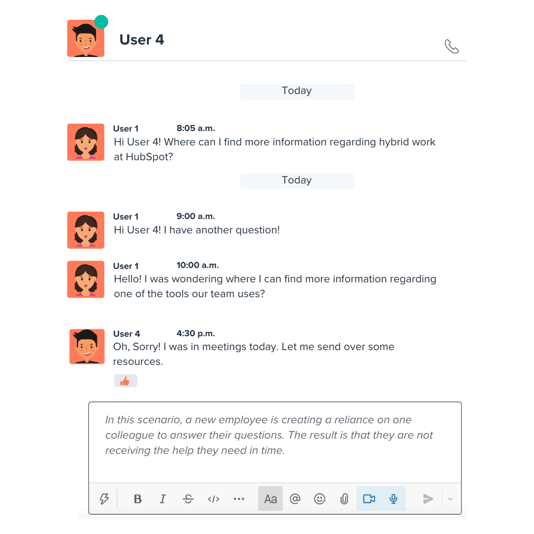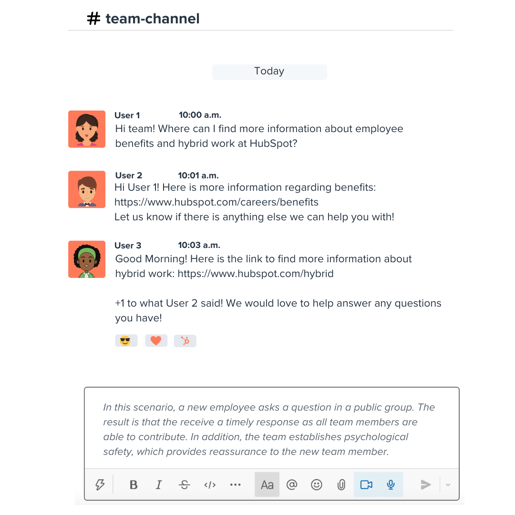Having a culture of posting messages and questions publicly provides many rewards. Encourage yourself and your teams to do so and you’ll see many positive effects.
It’s tempting to send an instant message to your colleagues, team, manager, or private group directly with questions (e.g. using Slack or Microsoft Teams). There’s security in keeping potential face-palm moments isolated. However, private messaging takes away many benefits that public posting provides. Here are some of the main advantages:
Public messages are:
1. Shareable
Posting questions publicly can easily bring others into the conversation, with context. Whoever helps you can also introduce you to the correct person/team to ask in future. No more direct messaging behind the scenes.

2. Searchable
Others (potentially many others) experiencing the same or similar problems can easily find and use your solution.
3. Collaborative
It lets people on your team know what you’re working on. They can learn from the conversation (even if they’re not participating).
4. Effective
This practice keeps you accountable to asking good questions. You’re more likely to spend time compiling a solid question when you know there’s a larger audience. Caveat: don’t put off a question if you’re not sure how to formulate it. In fact, you could explicitly call that out in your posted message and it may be another learning opportunity.
5. Overload-reducing
For example, if you message your manager, it’s likely only they can assist (at least initially). If you message your team channel, everyone gets an opportunity to answer/help out (which they may really want to do). In turn, this builds up relationships and trust with your team, and gives others a chance to shine with their expertise. Posting in a public place can also reduce the instant messaging urgency people sometimes feel.

6. Transparent
Transparency is a key tenet of how we work at HubSpot. It’s one of the reasons people love working here, and chances are, it’s something teams are craving at other orgs, as well. We all struggle and need help at times. It can be a relief to know when folks experience similar issues to you and need assistance.
Note: There are still some situations where direct messaging makes sense (e.g. for sensitive conversations.) New hires may not feel comfortable sharing their questions widely, especially not at first. If you’re not sure, ask the person you’re contacting to let you know if your message could’ve/should’ve been posted somewhere else.
Answering public questions
Responsibility for healthy conversations goes both ways. People asking questions should be made to feel safe, such that they can ask further queries without fear (essentially psychological safety). Promote good instant messaging etiquette amongst your team and you’ll reap these benefits.
Who is this post for?
Everyone. New joiners may be more likely to keep messages private, but subgroups within teams (e.g. team leadership) can be guilty of this too. Basically, anywhere there’s an avenue to post privately, it can lead to an over-reliance on that person/group.
.gif?width=406&name=RobBlogImage%20(Instagram%20Post).gif)
Lead by example by practicing what you preach. For example, if you’re a manager, don’t rely on private group messaging to get your message out. You can always write the message in a public team place and @ mention members directly.
Want to work on a team that's just as invested in how you work as what you're working on? Check out our open positions and apply.
